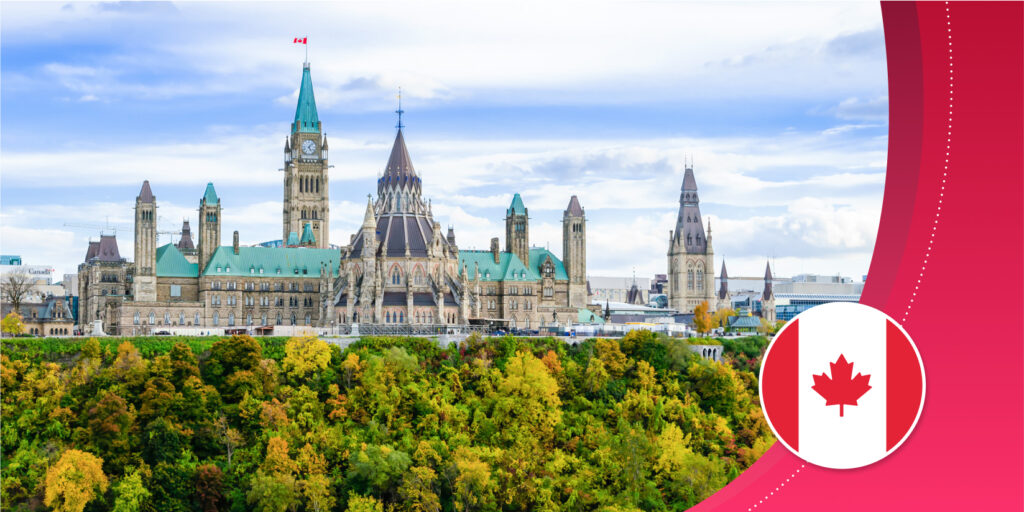Many aspects of Canada’s International Student Program, from access to the Post-Graduation Work Permit program to who is exempt from a study permit cap, have evolved significantly in 2024. While some changes are still unfolding, we’ll share answers to some of your most pressing questions about these Canadian policy updates below.
Note: This document is provided as information only, and is subject to change as policies are updated. This post was last updated on November 19, 2024. For official guidance relating to Canadian student visas and immigration, visit the Immigration, Refugees and Citizenship Canada (IRCC) website, or connect with a Registered Canadian Immigration Consultant.

Study Permit Cap Questions
How does the study permit cap work?
In January 2024, the Canadian government announced a temporary two-year cap on Canadian study permits. This means the number of applications for new Canadian study permits in 2024 will be limited to around 606,250, resulting in 360,000 expected study permit approvals. In 2025, the government has noted that up to 437,000 new study permits will be issued.
Study permit applications will be allocated based on each province or territory’s population.
Which students are exempt from the study permit cap?
In 2024, students in K-12, master’s degree, and doctoral degree programs are exempt from the study permit cap. So, this cap will mostly impact students at the undergraduate university and college level. However, in 2025, master’s degree and doctoral degree students will be included in the study permit cap.
Students who are current study permit holders, or who are applying for study permit renewals (extensions) are also exempt.
How will these changes impact K-12 international students?
The study permit cap does not apply to K-12 international students. K-12 students also do not need to include a provincial attestation letter (PAL) with their study permit application.
Are post-graduate certificate students exempt from the study permit cap?
No. Short postgraduate programs, like postgraduate diplomas and certificates, are not included on IRCC’s list of exemptions. Only master’s degree, doctoral degree, and K-12 students are exempt from the study permit cap in 2024.
How will private colleges and universities be impacted?
Private colleges and universities will be subject to the same rules and restrictions as public colleges and universities are.
What are public-private partnerships (PPPs) and how are they affected?
A PPP, or public-private partnership, is an agreement between a public college and an affiliated private college. In some provinces, public colleges may license their curriculum to instructors at a private college (which may be in a different city). So, while students physically attend classes at a private college, they graduate with a diploma from a public institution.
As of May 15, 2024, students who enrol at public-private partnership institutions (PPPs) may no longer apply for post-graduation work permits (PGWPs) after graduating.
Note: Although this change was originally announced as coming into effect on September 1, 2024, IRCC has since moved that effective date up to May 15.
Will the study permit cap impact make it more difficult for students to get Letters of Acceptance?
Since institutions will be allowed only a set number of admissions under the cap, certain programs will likely become more competitive. Institutions will want to be as sure as possible that they only grant acceptance letters to candidates who are likely to get study permit approval. This means that a strong application and GPA will be more important than ever for students, especially in popular provinces like Ontario and British Columbia.
In 2024, the criteria for master’s degree, doctoral degree, and K-12 students are unlikely to change, since those programs are unaffected by the cap. This may change in 2025 for master’s degree and doctoral degree programs, as they will be included in the study permit cap.
Do institutions have to keep track of which international students successfully enrol and take classes?
Proposed federal regulations will require colleges and universities to share with the Canadian Government if an international student has enrolled successfully and is attending classes.
If an institution does not comply, or if letters of acceptance were improperly issued, the institution may be added to a publicly accessible suspension list. All study permit applications submitted to an institution while it’s suspended will be returned to the applicants. Suspensions can last up to 12 months.

Provincial Attestation Letter and Territorial Attestation Letter Questions
What is a provincial attestation letter (PAL) or territorial attestation letter (TAL)?
A provincial attestation letter (PAL) or territorial attestation letter (TAL) is an electronic document that states that a student is entitled to submit their application for a study permit under a province or territory’s cap.
How can my students get a provincial attestation letter (PAL) or territorial attestation letter (TAL)?
PAL and TAL processes may vary by province or territory, and are set by each provincial or territorial government. In most cases, PALs and TALs are issued directly to students by academic institutions. For institutions outside of Quebec, we recommend contacting your academic institution for its specific process.
General TAL/PAL guidance for every Canadian territory and province is listed on the IRCC website.
Quebec was the first province to have a fully implemented PAL process. British Columbia’s process came into effect on March 4. All other provinces have set processes or begun issuing PALs as of March 28, 2024.
Check the IRCC page for the most up-to-date information.
Which students need a PAL or TAL for their study permit application?
As of January 22, 2024, most applicants must provide a provincial attestation letter to apply for their Canadian study permit. Generally, the only students exempt from needing a PAL or TAL are master’s degree, doctoral degree, preschool, and K-12 students, as well as students at a school participating in the Francophone Minority Communities Student Pilot or a federally designated military college.
The Certificat d’Acceptation du Québec/Québec Acceptance Certificate (CAQ) may work as a PAL, as long as it includes the following sentence: “This attestation letter confirms that the applicant has a place in Quebec’s share of the distribution of study permit applications or is exempt from it.”
For the latest updates, check the official IRCC website.
What happens if a student gets a letter of acceptance, but not a PAL or TAL?
In most cases, students with a letter of acceptance who pay their tuition deposit quickly will get a PAL. In the rare case that a student does not, they may request a tuition deposit refund. Students who aren’t exempt from needing a PAL may not study in that province or territory without one.
Should students wait to apply for a study permit until they have a PAL or TAL?
It depends. Study permit applications submitted before January 22, 2024, don’t require a PAL/TAL.
Certain students won’t need a PAL or TAL, including students applying for K-12, master’s degree, and doctoral degree programs. Exempt students may apply for a study permit as usual.
All non-exempt students should wait until they have a PAL/TAL. Study permit applications submitted by these students on or after January 22, 2024, without a PAL or TAL will be refunded and returned to the student. The student must then resubmit their application with the attestation letter, once it’s available.
Should students pay for their tuition deposit before getting a PAL or TAL?
Yes. Consider paying as soon as possible. The sooner that students pay any relevant tuition deposits, the sooner they’ll be in line for an attestation letter, which they need to apply for a study permit. This will make them less likely to be affected by the study permit cap.
Can students who don’t receive a PAL or TAL get a tuition deposit refund?
In most cases, students will be eligible to request a full tuition deposit refund if they are refused a PAL or a study permit. However, this will vary by institution, so check with the student’s target college or university. Some tuition deposits may be refunded, where others are non-refundable.
If a student decides to withdraw their application for personal reasons, an institution’s standard refund policy will apply.
If a student with a PAL or TAL switches programs before applying for their study permit, can they use the same PAL/TAL?
Currently, this is still unclear, and may vary by province. These letters are likely tied to a specific study program, meaning that a student switching programs would require a new PAL or TAL. If a student switches to another program at the same institution, they could ask the institution about getting a new or updated PAL/TAL to match, but this decision would be at the institution’s discretion.
If a student with a PAL or TAL reapplies to another program at the same institution, will the institution update that letter for the student?
The institution may be able to reuse or reissue that PAL/TAL (either for the same student or for another student) if the initial student doesn’t use their attestation letter. However, this possibility will depend on each province’s PAL/TAL process and what they allow.
After a study permit rejection, can a student use the same PAL or TAL to reapply for their study permit later?
No. This is yet to be officially confirmed, but it is safest to assume that once a PAL is submitted to IRCC as part of a study permit application, it has been used and cannot be reused. For this reason, make absolutely sure that a student is committed to their study program choice before applying for a study permit.

Timeline Questions
Should students proceed with a study permit right now?
Students who don’t require a PAL/TAL or who get a PAL/TAL from any province or territory may apply for their study permit. Otherwise, students who do need a PAL or TAL should wait until they receive one from their target institution (or province or territory).
Should students accepted to April or May intakes without a study permit defer their start date to September 2024?
Remember, K-12, master’s degree, and doctoral degree students don’t need a PAL/TAL, and are exempt from the study permit cap. Processes for these students haven’t changed, so they shouldn’t need to defer.
Other students, like those in undergraduate programs or graduate certificates, should consider deferring April or early May start dates if they are concerned they will not receive their study permit in time.
Can post-graduate degree students go ahead with a study permit application right now?
Yes. As students in post-graduate degree programs (like master’s and PhDs) don’t require a PAL or TAL, and are exempt from the study permit cap, they may proceed with their application.
Do students need to pay their tuition deposit before applying for a study permit?
Yes. Most institutions will require a student to pay their tuition deposit before issuing them a PAL or TAL, which will enable the student to apply for their study permit. In addition, while not explicitly stated on the IRCC website, proof of a tuition deposit payment is part of a student’s proof of financial capacity when applying for a study permit.
If a student wants to switch institutions, may they use the same study permit?
No. Moving forward, if a student wants to switch from one institution to another, they must apply for a new study permit before the start date of the new study program.

Study Program Questions
How can students assess their eligibility for a master’s degree?
It depends. EduCanada notes every Canadian college and university has its own rules for assessing international students’ academic credentials.
Some institutions will check students’ credentials in-house. Other students may need to use an assessment service to see if their degree is enough, or if they need to take another program (like an one-year postgraduate certificate) first.
How can students help their application to a graduate program stand out?
Understand the process. How students apply is a little different at each university. Create a calendar with deadlines for each institution, and ensure the student meets each milestone.
Start early. If students rush, they’ll miss things, which can put their application at risk. Requesting transcripts, gathering documents, asking for references, and writing a personal statement can take longer than expected.
Tailor each application. Match the student’s work and education experience to the specific program. Highlight this in their resume, reference letters, and personal statement.
Can students still work part-time while studying?
Yes. As of November 8, 2024, eligible students may now work up to 24 hours per week in off-campus jobs while class is in session. During an academic break (like over the summer, for those not taking summer courses), students may work full-time hours until the fall semester begins.

Bringing Family to Canada with a Study Permit
Can partners and spouses of students no longer get an open work permit? When does this take effect?
As of September 18, 2024, new work permit rules have now come into effect, building on previous updates from March 2024.
Now, spouses and common-law partners of students with valid study permits may only get an open work permit if the student is enrolled in certain programs. Eligible programs include either a master’s degree program (of at least 16 months in duration) or doctoral degree program at a university or polytechnic institution, or one of these professional degree programs at a university:
- Doctor of Dental Surgery (DDS, DMD)
- Bachelor of Law or Juris Doctor (LLB, JD, BCL)
- Doctor of Medicine (MD)
- Doctor of Optometry (OD)
- Pharmacy (PharmD, BS, BSc, BPharm)
- Doctor of Veterinary Medicine (DVM)
- Bachelor of Science in Nursing (BScN, BSN, BNSc)
- Bachelor of Education (B. Ed.)
- Bachelor of Engineering (B. Eng., BE, BASc)
Undergraduate and college students who are planning to bring their spouse or common-law partner to Canada should be aware of this change, as their partners will no longer be eligible to work if the student is not studying in one of the above-listed programs.
Can diploma or certificate students bring dependants to Canada?
Diploma and certificate students (undergraduate or graduate) may bring dependants. Generally, these dependants are no longer eligible for an open work permit. This means that these dependants may apply for a visitor visa or their own study permit, but may not work full-time.
Can students still bring their children to Canada?
Yes, students may still bring their dependent children to Canada. The child or children must apply for their own visitor or study permit (or work permit, if eligible). Here are the government’s guidelines to see if your child is dependent.
Who can accompany a K-12 student coming to Canada?
Minor children (17 years old or younger) must either come with their parent(s) or legal guardian(s) to Canada, or have an appointed custodian.
If their parent or guardian has a work or study permit, the K-12 student still needs their own study permit. See the Government of Canada’s website for more details.
Is a parent or guardian accompanying a K-12 student eligible for a Canadian work permit?
Having a child in a K-12 study program in Canada does not immediately qualify a parent or guardian for a Canadian work permit. Parent(s) or guardian(s) must apply for their own work or study permit.

Post-Graduation Work Permit (PGWP) Questions
Which students may apply for a PGWP after graduation?
It’s important to know that PGWP program eligibility will work differently for students who submitted their study permit application before November 1, 2024, and those who submit their study permit application after that date.
If a student submitted their study permit before November 1, 2024:
- If their program is under 8 months long, they are not eligible for a PGWP.
- If their program is at least 8 months long, but shorter than 2 years, their PGWP will be valid for up to the same amount of time as their study program (a new grad from a 10 month program would receive a PGWP of up to 10 months.)
- Graduates from non-master’s degree programs which are two years or longer receive a PGWP of up to three years.
- Master’s degree graduates receive PGWPs of up to three years, even if their program is under two years long.
If a student submitted their study permit after November 1, 2024:
Bachelor’s degree, master’s degree, or doctoral degree program:
- Meet criteria for CLB or NCLC at level 7 or higher in all language areas.
- No additional field of study requirement.
Any other university program (e.g. certificates or diplomas):
- Meet criteria for CLB or NCLC at level 7 or higher in all language areas.
- Study program must be in a PGWP-eligible field of study.
College program, or any other program not listed above:
- Meet criteria for CLB or NCLC at level 5 or higher in all language areas.
- Study program must be in a PGWP-eligible field of study.
If applying for PGWP after November 1, 2024, all applicants must also meet Canadian Language Benchmark (CLB) requirements for English or Niveaux de competence linguistique canadiens (NCLC) for French proficiency. Language proficiency test results must be less than two years old when the PGWP application is submitted.
As of May 15, 2024, the PGWP program will no longer be open to new students at public-private partnership (PPP) institutions. However, students who are already enrolled in a study program at a PPP before May 15, 2024, may still apply for a PGWP.
How is the PGWP program changing?
Starting February 15, 2024, graduates from master’s programs of less than two years, but lasting at least eight months, may be eligible for a three-year PGWP.
Also, as of May 15, 2024, the PGWP program will no longer be open to new students at public-private partnership institutions (PPPs). However, students who are already enrolled in a study program at a PPP before May 15, 2024, may still apply for a PGWP.
Starting on November 1, 2024, all PGWP program applicants must meet CLB or NCLC language criteria for their level of study (at least level 5 for college graduates, and level 7 for university graduates). College or non-degree university program graduates must also have studied a PGWP-eligible field of study to apply for a PGWP.
Can students who have completed multiple programs combine their study duration to receive a longer PGWP?
Yes, as long as both programs were at least eight months long (or 900 hours for Quebec credentials) and PGWP-eligible. If you already had a PGWP after completing the first study program, you may not apply for PGWP again.

General Questions
How do you predict these changes will impact Canada’s reputation as a study destination?
The severity and suddenness of these policy changes will affect Canada’s reputation in the short term, meaning some students will look elsewhere for study opportunities. In the long term, once the new processes are set, Canada will still be perceived as a strong option, especially for master’s students and those who qualify for the still-excellent post-graduation work permit.
Within Canada, geographic interest may shift, with provinces like Alberta expected to become more popular.
Are similar policy updates happening in ApplyBoard’s other study markets?
In 2023, Australia increased its minimum cost of living amount for students, and further policy changes have unfolded throughout 2024. Australia is also scheduled to put a soft cap on its number of incoming international students in 2025. In the United Kingdom, changes to students’ dependent policy are predicted to impact student trajectories. For more information, refer to ApplyBoard’s blog and ApplyInsights.
Where can we find cost of living information for different parts of Canada?
A quick way to learn about cost of living is to use a cost of living calculator, like this one from WOWA or TD Bank’s student budget calculator. Some provinces and institutions also offer custom calculators.
Where can we find more information?
- Official study permit information and guidance: the Government of Canada’s website
- Policy analysis, news, and sector trends: ApplyInsights
- Student-friendly strategies for the international study journey: ApplyBoard blog
- Strengthen your knowledge of Canada as a study destination: take our free ApplyBoard Counsellor Course: Canada



